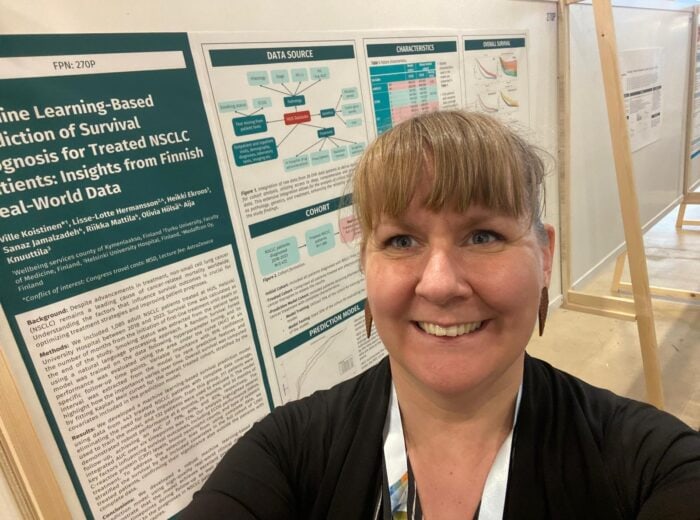Medaffcon Presented Insights from Finnish Real-World Data at European Lung Cancer Congress
Medaffcon's European Lung Cancer Congress (ELCC) poster showcased key findings from a recent study on non-small cell lung cancer (NSCLC).
Samuli Tuominen, senior data scientist at Medaffcon, has co-authored a study that utilised propensity-score matching to compare the performance of two immunosuppressive drugs in patients with primary sclerosing cholangitis after liver transplantation.
Medaffcon has helped to validate the superiority of tacrolimus over cyclosporine as a post-liver transplantation immunosuppressive regimen for patients with primary sclerosing cholangitis, a rare immune-mediated cholestatic liver disease.
The debate over which of the two calcineurin inhibitors is the optimal regimen for the patients was settled in a recent retrospective study conducted for the European Liver and Intestine Transplant Association (ELITA) by Medaffcon and Helsinki University Hospital (HUS).
The study compared the performance of the inhibitors using real-world data from the European Liver Transplant Registry (ELTR) and the US Scientific Registry of Transplant Recipients (SRTR). The data comprised practically all over 18-year-old patients with the liver disease who underwent liver transplantation in 2000–2020.
The researchers estimated the 10-year survival rate for patients who were prescribed tacrolimus as part of their initial immunosuppressive regimen at 73 per cent and patients who were prescribed cyclosporine at 65 per cent. The 10-year estimate for graft survival was similarly eight percentage points higher for patients on tacrolimus than patients on cyclosporine, 62 and 54 per cent, respectively.
“In short, the study shows a clear difference between patients on tacrolimus and cyclosporine in favour of tacrolimus, both in terms of overall mortality and re-transplantation,” sums up Samuli Tuominen,one of the co-authors of the study and senior data scientist at Medaffcon. “The performance was measured across various sub-categories – age, gender, registry and year of transplantation – but the results were consistent: tacrolimus is better.”
Tacrolimus is already the recommended regimen under current guidelines, so in that sense the study won’t change much. But it does validate the existing clinical understanding.”
Tuominen, who was in charge of cleaning, analysing and reporting the research data, confirms that utilising data collected from dozens of countries over a two-decade period complicated the study due to differences in data formats and consistency on the one hand, and geographical and temporal differences in clinical practices on the other.
“Cyclosporine use decreased with the uptake of tacrolimus during the 2000s,” he elaborates.
The researchers initially identified 634 patients with primary sclerosing cholangitis who received cyclosporine and 10,419 patients who received tacrolimus after liver transplantation. The final study cohort, however, was reduced to 399 cyclosporine-treated patients and 1,197 tacrolimus-treated patients through propensity-score matching.
The matching technique effectively estimates the probability of a patient receiving a particular treatment based on a number of covariates, or underlying variables. The variables used in the study included the age and gender of both graft recipient and donor, the graft type (full or reduced), and the status of primary sclerosing cholangitis as the primary or secondary indication for liver transplantation.
The estimates were then used to match the patients on a one-to-three ratio due to the imbalance in the data.
Herein lies one of the core strengths of Medaffcon, according to Tuominen. Matching patients, he underlines, is a critical step in any medical or pharmaceutical study that relies on real-world evidence, be it a study supplementing a randomised controlled trial, a trial with a virtual control arm or a retrospective fully register-based study.
Whenever you compare two treatments or patients to one another, it’s possible that treatment selection was dictated by some underlying factors that also have a link to the treatment outcome,” he explains.
“If you don’t take the underlying variables into consideration, you can draw the wrong conclusion about the treatment’s effectiveness.”
Real-life patients, he illustrates, are typically older and in poorer health than patients participating in clinical trials, which can have strict inclusion criteria concerning patient age and health to make sure the participants can tolerate the treatment. Also, in ordinary health care settings, the treatment options available to clinicians tend to decrease as patient age and co-morbidities increase.
Tuominen tells that although the study design can influence the matching accuracy – for example, not all covariates assessed in a clinical trial are available in real-world data – the matching techniques themselves are widely applicable across different settings.
“Matching for real-world evidence is absolutely a core competence area here at Medaffcon,” he states.
Medaffcon, founded in 2009, is a Nordic research and consulting company specializing in Real-World Evidence, Medical Affairs, and Market Access. With offices in Stockholm, Sweden, and Espoo, Finland, we provide expert services across the Nordic region. Our services combine strong medical and health economic expertise with modern data science.
The company employs some 30 experts. Since 2017, Medaffcon has been a subsidiary of Tamro Oyj and is part of the PHOENIX group, which is a leading provider of healthcare services in Europe.

Medaffcon's European Lung Cancer Congress (ELCC) poster showcased key findings from a recent study on non-small cell lung cancer (NSCLC).

The algorithm was originally developed to extract smoking status from patient texts with purpose to analyze the effects of smoking on postoperative complications. Today, it is also being utilized in lung cancer research.

5th Nordic RWE and AI conference is organized by University of Helsinki and Åbo Akademi University. Register to the event here!

Sr. Data Scientist
MSc (Statistics)
Samuli joined Medaffcon in November 2018. He acquired a master’s degree in Statistics at the University of Helsinki, specializing in Bioinformatics in September 2018. Before joining Medaffcon, Samuli had two years’ worth of experience in research as a research assistant at the University of Helsinki, where he contributed to unraveling the genetic and epigenetic background of psychological characteristics (Depsy-group).
Samuli is especially interested in producing influential research data based on information on real-world patients. He is also interested in applying varying statistical and machine learning methods. Samuli has a broad theoretical and methodological understanding, as well as experience in working with big data. He is a problem solver and has an analytical take on work.
“I see that the health sector is being transformed by digitalization. I am excited to further develop the new opportunities made possible by the automated collection of patient data”.

Sr. Scientific Advisor
RWE Lead
PhD
+358 50 345 2393
mariann.lassenius@medaffcon.com
Mariann joined Medaffcon’s team in 2016 after finishing her PhD. The transition to real world evidence (RWE) research was a natural continuum to her previous research career. Through RWE studies, she has had the privilege to gain a broad insight into working with different stakeholders within the healthcare field. The vast proportion of her days goes towards interacting with clients, planning and performing RWE studies, and supporting Medaffcon’s RWE team. Subjects that keep her work interesting are the vast variability of customers and projects, problem-solving, and interacting with people.
“The number of RWE studies has increased since stakeholders within the healthcare industry have an increasing demand for knowledge-based decision making tools that need to be fulfilled. The future, therefore, has an ever-increasing emphasis on RWE”.